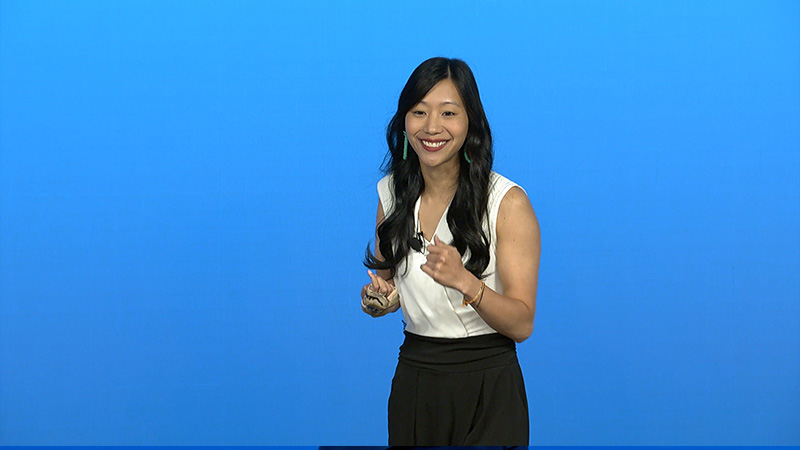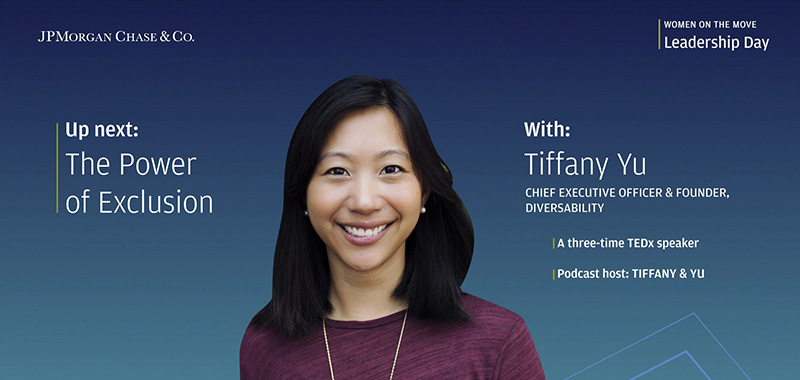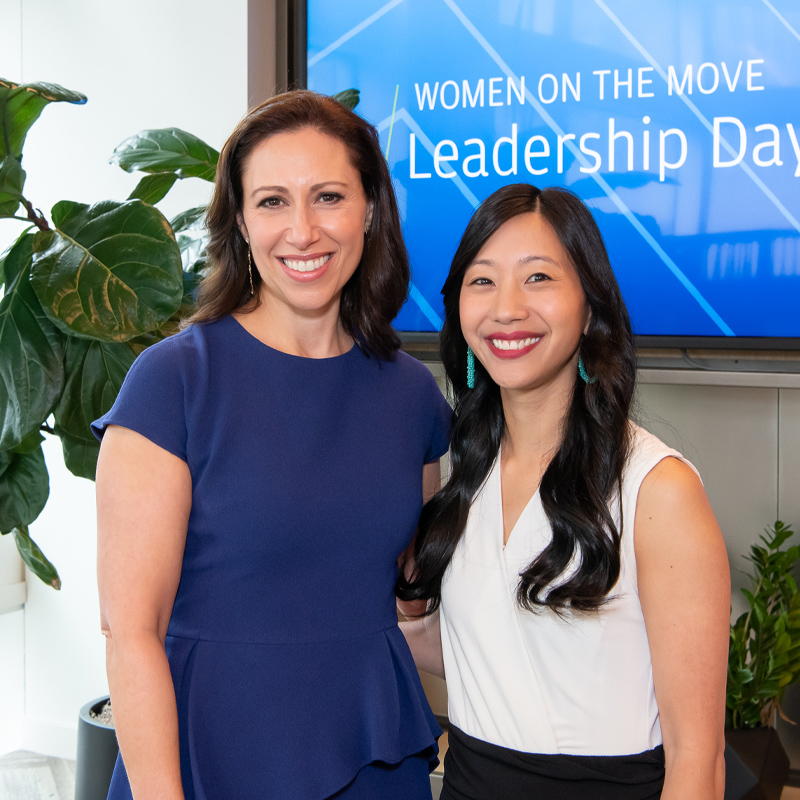Tiffany Yu:
So, a lot of people might not know this, but I actually started my career in investment banking on Wall Street a little over a decade ago. So it feels like a full circle moment to be able to come back here. So, I thought I would take a step back and introduce myself first. I'm the first-generation daughter of a Taiwanese immigrant and a refugee from the Vietnam War. And I grew up with a Japanese proverb that says, that "The nail that sticks out gets hammered down." The nail that sticks out gets hammered down. Don't draw any attention to yourself. So I wanna take you back to a story, I'm nine years old, it's 1997, I'm aging myself a little bit. And more specifically, it's November 29th, 1997. It's Thanksgiving weekend and it's actually the day after my dad's 49th birthday. My mom has to travel for a business trip, so a couple of my siblings and I thought that we would go and see her off at the airport. And on the way home, my dad lost control of the car. So instead of this long weekend at home, I ended up spending three weeks in the hospital. I sustained a handful of injuries, including shattering a couple of bones in one of my legs that would leave me in a wheelchair for four months and permanently paralyzing one of my arms. My dad also passed away. So when I look back to that weekend, I thought it was supposed to be about gratitude and family and celebration of life and abundance, but now it was about loss. When I was nine years old, my family changed forever. When I was nine years old, my body changed forever. And when I was nine years old, my life changed forever. After this four month rehabilitation period, I was walking again and I had relearn how to write with my left hand – I used to be right-handed. I went back to school and I was thrust into this environment where I was not only still grieving the loss of my dad, but also grappling with this new identity as a person with a disability. One of my least favorite memories growing up was my mandatory Physical Education class. I'd always hated PE, but now it was worse. I remember I would get dressed for this class every single day and I would stand there as the team captains my classmates would go and pick their teammates. And I would watch my peers leave my left and my right by my side until I was just standing on my own. No one wanted me to be on their team. And it doesn't matter if it was disability or not, but things like that not being picked for a team every single day can have a lasting impact on how we feel like we can contribute to society. So I sat on the sidelines of the gym and I sat on the sidelines of life; my nail had been hammered down. My mom, who was now a newly single parent, had to raise four kids on her own. And she did everything that she could to make sure we still had a roof over our head and food on the table, for which I'm extremely grateful. But it also meant that she worked so hard that she was never home so I never got the emotional support that I needed. At school, I felt so excluded and at home I felt so isolated and alone. I would end up spending the next decade sitting in that space, sitting in spaces of pity, victimization, and shame. I also spent that time not telling anyone about the car accident. I didn't think that the story mattered or that anyone cared. I internalized so many messages growing up that my story and my voice didn't matter, my nail had been hammered down. And so after about-- and the worst part about all of this it wasn't, and the hardest part of all of this wasn't necessarily the car accident. It was the fact that I felt like I needed to be silent about something so hard that had happened to me, but also that I would show up at school every day and feel so excluded. And loneliness actually creates this negative spiral where we not only continue to isolate ourselves, we end up elevating ourselves into this fight or flight threatened state. And it also impacts our sense of self and our sense of confidence. So after about a decade, I actually had an opportunity to talk about the car accident publicly for the first time ever. I was a senior in college at the time. And I wish I could tell you with some light switch moment where all of a sudden I shared the story of the car accident and rainbows and flowers and butterflies and it was all great. But really what it ended up happening was all of these years, this decade plus of microaggressions, of slights, of stairs made me realize that people were pretty uncomfortable with disability. And as a result, they were uncomfortable with me. And all I really wanted was to be liked, to be accepted, to be understood. And so, because we don't really understand disability, we don't know how to talk about it, right? We're so afraid of saying something offensive or not politically correct so we ended up saying nothing at all. And while silence is an answer in itself, in this case it's not a very productive answer because when we stay silent we actually don't grow and we don't learn. And when we stay silent about the things that we're uncomfortable with and we don't name and articulate the discomfort, what we end up doing is we end up not providing an opportunity to have a conversation so that we can make progress forward together. So, because we're so silent, because we're so uncomfortable about this topic, we end up relying on stereotypes. And the stereotypes are usually reinforced by the media. And the media is continuing to send me messages that I have a medical diagnosis that needs to be treated and fixed, there's something broken about my body. These messages continue to tell me that, disability is a tragedy, my disability is tragic or that I'm a charity case and the expectations are set so low. But the problem with these mindsets is that they're rooted in assumptions, assumptions that people with disabilities can't dream, can't achieve. And because of that, we're not even given the chance to succeed. And we start to internalize so many of those harmful messages. We see the disability, we see how others see our disabilities and then we internalize what we think our own capabilities, which are much lower than the bar of where we actually can be. The thing is though, no one asked me how I wanted to see myself. I don't wanna go around my life feeling like I need to be fixed or feeling like I'm broken or that my body is tragic. I started to really think about, disability as a human experience. What if we look at disability as identity, as part of the fabric of who we are? And similar to other aspects of identity they can be rooted in pride and empowerment. So when I took a look at these years and I looked at, something I thought about every single day the fact that I exist as a one-armed human in a two-armed world, no one was talking about and no one was acknowledging. And when you don't talk about or acknowledge part of my identity, I as a whole feel invalidated, insignificant and invisible; my nail had been hammered down. So why am I talking about this? Not only because I hold this identity, but the fact that there are over a billion people globally who live with some sort of a disability. Social isolation, loneliness, and exclusion, are experiences at those of us with disabilities know so well, we know them just way too intimately. And that's a lot of people who are feeling forgotten, overlooked, and invisible. So when I think about the title of this talk, the Power of Exclusion. The power of exclusion, what exclusion looks like and means to me is it means feeling like a burden. Which is one of the most dangerous things that anyone can ever feel. It means feeling like you don't belong and you have to ask for permission just to show up. Exclusion is actually what became the fuel to my fire. Based on all of these experience that happened to me, I became really passionate about inclusion, belonging, and empowerment. I never wanted anyone who met me or touched my work to feel like they were alone. And I never wanted anyone to feel like they didn't matter. So today I'm using whatever power and privilege I have to changing the way that the world sees and defines disability. So when I couldn't find community, I created it. And I know definitions are very important, so a community is a group of people who come together to nurture your own growth and each other's growth. And there's something so powerful about community it's where you feel socially connected, it's where you feel like you belong and it's where you feel empowered. And there's a Harvard study that shows that one of the keys to our longevity and our happiness is rooted in social connection and healthy relationships. Community is the place where you feel like you have people who are supporting you, who are you up, who challenge you, people who see you for your potential. That is what I so desperately wanted to be surrounded by as a kid and is what I wanna be surrounded by every single day. So I recently learned a little bit more about some of the factors that create belonging. Belonging happens when you are seen for who you are and what you can contribute, belonging happens when you can meaningfully connect one-on-one with people in the community, belonging happens when you feel supported in your own growth journey, and belonging happens when you feel proud of the community's values. The community I created is called Diversability. I often joke that Diversability to me, is the disability employee resource group that exists outside of the company. One of the best ways to tackle any type of bias is through real life continuous experiences with people who challenge your stereotypes and that's what we're doing every single day. What we do is we provide a platform for our disabled community members to come and share their own stories in their own words, just like I did today. So that we can humanize our experiences. We wanna bring the non-disabled allies into our work so that all of us can celebrate and recognize the fact that all of us have diverse, lived experiences that we're just waiting to share, and that we all have gifts, gifts to impart on the world. And so over the years, I started Diversability in 2009. Over the years, we've had our fair share of successes. Our work has been featured in Forbes, Marie Claire, The Guardian. Before the age of 30, I found myself at the World Economic Forum annual meeting in Davos, Switzerland, rubbing elbows with CEOs and world leaders and academia about the importance of disability inclusion. Last year, I had the opportunity to co-chair a Summit on the United Nations Sustainable Development Goals alongside the President of Columbia the country, because why not me? And today, I get to be one of your keynote speakers at this incredible event. So when I think about the social isolation, the grief and trauma that all of us have been through this pandemic, I'm reminded of the lessons from my own journey that healing, inclusion, and belonging come and happen in community. Nadine Burke Harris or Dr. Nadine Burke Harris, has talked about how those of us who have Adverse Childhood Experiences or ACEs or childhood trauma have life outcomes and health outcomes that look very different from my own. And so I want to acknowledge that while this is a story about enormous amounts of loss and grief and childhood trauma, it's also a journey of everything that I've gained and how much I've grown. I oftentimes remind myself in these softer moments of a quote from Francis Weller and he says, "The work of the mature person is to carry grief in one hand and gratitude the other, and to be stretched large by them. How much sorrow can I hold? That's how much gratitude I can give." So I feel like I got invited here today, 'cause I was gonna talk to you about embracing and overcoming adversity. And I think so many of us want these stories of overcoming adversity and overcoming trauma and overcoming pain. But I don't think it's about overcoming because those things are still part of who we are. I think it's instead about becoming, about embracing, about living with the things that have happened to us. So I wanna come back to this Japanese proverb that I started this with, "The nail that sticks out gets hammered down." "The nail that sticks out gets hammered down." As a disabled woman of color, I sit at the dangerous intersection of racism, misogyny, and ableism. The system that we currently exist in tells me, that my nail needs to be hammered down. And as you saw in this story, my nail was hammered down a lot. But what I've learned is that I don't have, what I've learned is that I am that nail that sticks out I don't have the luxury or privilege to disappear. It is my duty to be that nail. So what I've learned instead is to be proud to be that nail that sticks out. And while I shared some of our success stories earlier I think that the biggest success of all for me, is that I like my nail. I like that I'm the nail that sticks out. And the fact that all of you are here today and for everyone watching, you are a nail that sticks out in one way or another, too. And I wanna remind you that every time you use your voice, your power, and your privilege to show the world exactly who you are, you are paving a way for all of us who thought that invisibility was our only method of survival. And what I really trust, what I believe in is that soon we won't be that only nail that sticks out, we’ll be joined by another nail that sticks out and another nail that sticks out. And that will become a community of nails that stick out. And so, in community of nails that stick out is how we thrive. And so I wanna remind all of you that your visibility and your success is a win for all of us. Thank you so much for being that nail.
END






